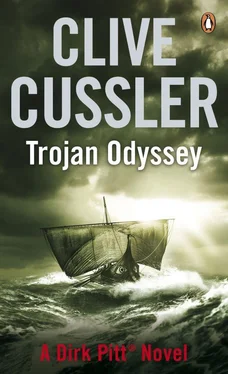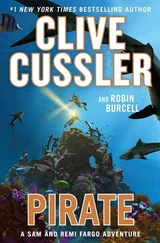"Wasn't any of this taken into consideration by the architects?" asked Yaeger.
Sandecker scowled. "We pointed out the problem to them, but were ignored by the founder of the resort corporation who owns it."
"He was satisfied that an international team of marine engineers pronounced it safe," added Gunn. "And because the United States has no jurisdiction over a foreign enterprise, it was out of our hands to interfere with its construction."
Sandecker put the specifications back in the file and closed it. "Let us hope the hurricane building off West Africa will either bypass the hotel or fail to build to a Category Five with winds exceeding a hundred and fifty miles an hour."
"I've already alerted Captain Barnum," said Gunn, "who is supporting the Pisces coral investigation not far from the Ocean Wanderer, to keep a wary eye on any hurricane warnings that might put them in the path of a coming storm."
"Our center in Key West is watching the birth of one now," said Yaeger.
"Keep me informed as well," advised Sandecker. "The last thing we need is a double disaster in the making."
When Yaeger returned to his computer console, he found a green light blinking on the panel. He sat down and typed in the code that prompted Max to put in an appearance, along with the urn that rose from inside the floor.
When she fully appeared, he asked, "Have you analyzed the urn from Pisces?"
"I have," Max answered without hesitation.
"What did you find out?"
"The people on board Sea Sprite did a poor job of scouring away the growth," Max complained. "The surface still had a calcareous scale adhering to it. They didn't even bother to clean the interior. It was still filled with accretions. I had to apply every imagery system I could tap to get a relevant reading. Magnetic resonance imaging, digital X rays, 3-D laser scanner and Pulse-Coupled Neural Networks, whatever it took to obtain decent image segmentation."
"Spare me the technical details," Yaeger sighed patiently. "What are the results?"
"To begin with, it is not an urn. It is an amphor because it has small handles on the neck. It was cast from bronze during the Middle to Late Bronze Age."
"That's old."
"Very old," Max said confidently.
"Are you certain?"
"Have I ever been wrong?"
"No," said Yaeger. "I freely admit, you've never let me down."
"Then trust me on this one. I ran a very meticulous chemical analysis of the metal. Early hardening of copper began about thirty-five hundred B.C., with the copper enriched with arsenic. The only problem was that the old miners and coppersmiths died young from the arsenic vapors. Much later, probably through an accident sometime after twenty-two hundred B.C., it was discovered that mixing ninety percent copper with ten percent tin produced a very tough and durable metal. This was the beginning of the Bronze Age. Fortunately, copper was found throughout Europe and the Middle East in great supply. But tin was fairly rare in nature and more difficult to find."
"So tin was an expensive commodity."
"It was then," said Max. "Tin traders roamed the ancient world buying ore from the mines and selling it to the people who manned the forges. Bronze produced a very advanced economy and made many of the early ancients rich. Everything was forged, from weapons — bronze spearheads, knives and swords — to small necklaces, bracelets, belts and pins for the ladies. Bronze axes and chisels greatly advanced the art of woodworking. Artisans began casting pots, urns and jars. Taken in proper perspective, the Bronze Age greatly advanced civilization."
"So what's the amphor's story?"
"It was cast between twelve hundred and eleven hundred b.c. And in case you're interested it was cast using the lost-wax method to produce the mold."
Yaeger sat up in his chair. "That puts it over three thousand years old."
Max smiled sarcastically. "You're very astute."
"Where was it cast?"
"In Gaul by ancient Celts, specifically in a region known as Egypt."
"Egypt," Yaeger echoed skeptically.
"Three thousand years ago the land of the pharaohs was not called Egypt, but rather L-Khem or Kemi. Not until Alexander the Great marched through the country did he name it Egypt, after the description in the Iliad by Homer."
"I didn't know the Celts went back that far," said Yaeger.
"The Celts were a loose collection of tribes who were involved with trade and art as far back as two thousand b.c."
"But you say the amphor originated in Gaul. Where do the Celts come into the picture?"
"Invading Romans gave Celtic lands the name Gaul," explained Max. "My analysis showed the copper came from mines near Hallstatt, Austria, while the tin was mined in Cornwall, England, but the style of artwork is suggestive of a tribe of Celts in southwestern France. The figures cast on the outer diameter of the amphor are almost an exact match to those found on a cauldron dug up by a French farmer in the region in nineteen seventy-two."
"I suppose you can tell me the name of the sculptor who cast it."
Max gave Yaeger an icy stare. "You didn't ask me to probe genealogical records."
Yaeger thoughtfully soaked in the data Max reported. "Any ideas how a Bronze Age relic from Gaul came to be in a coral cavern on the Navidad Bank off the Dominican Republic?"
"I was not programmed to deal in generalities," answered Max haughtily. "I haven't the foggiest notion how it got there."
"Speculate, Max," asked Yaeger nicely. "Did it fall off a ship or perhaps become scattered cargo from a shipwreck?"
"The latter is a possibility, since ships had no reason to sail over the Navidad Bank unless they had a death wish. It might have been part of a cargo of ancient artifacts going to a rich merchant or a museum in Latin America."
"That's probably as good a guess as any."
"Not even close, actually," Max said indifferently. "According to my analysis the encrustation around the exterior is too old for any shipwreck since Columbus sailed the ocean blue. I dated the organic composition in excess of twenty-eight hundred years."
"That's not possible. There were no shipwrecks in the Western Hemisphere before fifteen hundred."
Max threw up her hands. "Have you no faith in me?"
"You have to admit that your time scale borders on the ridiculous."
"Take or leave it. I stand by my findings."
Yaeger leaned back in his chair, wondering where to take the project and Max's conclusions. "Print up ten copies of your findings, Max. I'll take it from here."
"Before you send me back to Never-Never Land," said Max, "there is one more thing."
Yaeger looked at her guardedly. "Which is?"
"When the glop is cleaned out from the interior of the amphor, you'll find a gold figurine in the shape of a goat."
"A what?"
"Bye-bye, Hiram."
Yaeger sat there, totally lost, as Max vanished back into her circuits. His mind ran toward the abstract. He tried to picture an ancient crewman on a three-thousand-year-old ship throwing a bronze pot overboard four thousand miles from Europe but the image would not unfold.
He reached over and picked up the amphor and peered inside, turning away at the awful stench of decaying sea life. He put it back in its box and sat there for a long time, unable to accept what Max had discovered.
He decided to run a check of Max's systems first thing in the morning before sharing the report with Sandecker. He wasn't about to take a chance on Max somehow becoming misguided.
The average hurricane takes an average of six days to mature to its full magnitude. Hurricane Lizzie did it in four.
Her winds spiraled at greater and greater speeds. She quickly passed the stage of "Tropical Depression" with wind speeds of thirty-nine miles per hour. Soon as they sustained seventy-four miles an hour, she became a full-fledged, certified, Category 1 hurricane on the Saffir-Simpson scale. Not content to simply become a lower-end tempest, Lizzie soon increased her winds to one hundred and thirty miles an hour, quickly passing Category 2 and charging into a Category 3 system.
Читать дальше












